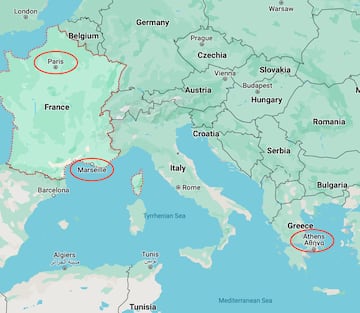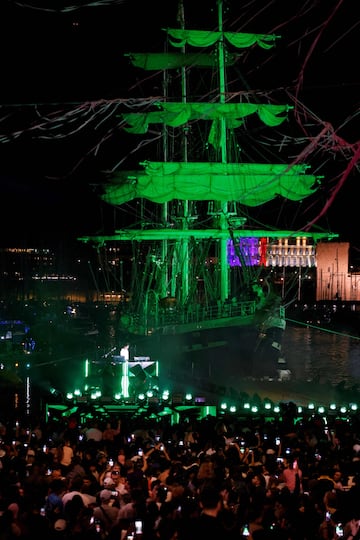OLYMPIC GAMES 2024
When does the Olympic flame arrive in France? What city and how is it taken from Athens?
With July’s 2024 Olympic Games being held in France, the famous flaming torch must make the journey between the two European countries.

The Olympic flame arrived in France on Wednesday 8 May, as the countdown to the Paris 2024 Olympic Games continues. And while the Games themselves take place in the French capital Paris, getting underway at the end of July, the flame touched down in the territory in the city of Marseille.
But why Marseille and not direct to Paris? Well, that’s a simple case of geography and transporting choice.
How did the Olympic torch travel from Greece to France?
The iconic flame arrived aboard the sailing ship named Belem. There were around 150,000 people ready to welcome its landing, following a trip that lasted 12 days, coming from the historic home of the Games, Athens in Greece.
For those less familiar with the geography of Europe, and these two countries in particular, you will see from the map below that a boat trip is best stopping at the coastal city of Marseille, before a land journey to the more northern capital.

Florent Manaudou, Olympic medalist in swimming, will be responsible for receiving the Olympic torch and thus beginning a journey that will culminate on 26 July with the opening ceremony of the Olympic Games.
How old is the French ship Belem?
Constructed in 1896 in Nantes, the Belem is now 128 years old and stands as the final testament to French three-masted ships. Its storied past spans the globe, weathering historical upheavals and transformations. From its origins, it found itself under the ownership of Sir Arthur Ernest Guinness, an Irish engineer and brewer, who converted it into a luxurious yacht.


In 1979, a new chapter began as the National Union of Savings Banks of France and the French Navy acquired the Belem, embarking on an extensive restoration project. Since then, it has graced significant occasions such as the centennial celebration of the Statue of Liberty in New York and Queen Elizabeth’s Jubilee in London. Notably, its link with the Olympic Games solidified during the 2012 event in London.

During those Games, the Belem opened its decks to the families of French athletes. Today, it carries the honor of ferrying the Olympic flame to French soil. With its impressive dimensions – 58 meters long, 34 meters tall – and a cruising speed of approximately 17 kilometers per hour, the Belem boasts a legacy of 33 voyages completed between 1896 and 1914.





